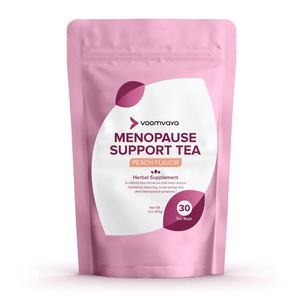Menopause and mood swings are like the annoying twin sisters who everyone knows, but no one wants to hang out with.
Ask anyone to mention one symptom of menopause and the first thing that usually comes to mind is “mood swings.” Why? Well, for one thing, it’s true.
Menopausal women do have plenty of mood swings. Plus, it’s the one symptom that everyone can notice from the outside looking in. Those who go through menopause are well aware of the other symptoms, such as weight gain and hot flashes, but those wild and erratic mood swings are not a pretty picture.
So, why does menopause send some women from happy to ferocious in 5.2 seconds? Let’s take a look at the body chemistry to better understand why these mood swings strike and what you can do to sidestep them as much as possible.
Hormones and Mood Swings

There are two reproductive hormones produced by the body that have an effect on mood (and other things): estrogen and progesterone.
During both perimenopause and menopause itself, the body produces less of both hormones. The levels of estrogen can vary from day to day and moment by moment, leading to mood swings, since estrogen plays a large role in how the brain utilizes serotonin (yes, the “feel good” chemical).
While less progesterone is also produced, this hormone plays a larger role in your reproductive cycle, not your moods, so estrogen is mainly to blame here.
As your estrogen levels change rapidly, so does your mood, allowing you to go from happy to cranky in the matter of minutes. Not only can these mood swings make you feel as though you’re going crazy, but they also aren’t much fun for the people around you either. Watch out, boys!
Preventing Mood Swings

Mood swings aren’t much fun for those who are going through them, but the good news is that they can be prevented. There are a number of options, including:
https://voomvaya.com/collections/frontpage/products/menopause-support-tea-
Low-Dose hormones - Many doctors provide a prescription for low-dose dual birth control (it contains both progesterone and estrogen) to women going through perimenopause.
It provides a steady flow of hormones each day, helping to make those mood swings something of the past.
-
SSRIs –An SSRI, also known as Selective Serotonin Reuptake Inhibitors or anti-depressants, can help level out the amount of serotonin in the brain, making mood swings less likely to occur.
In addition, they combat the raised levels of anxiety and depression that menopausal women have to deal with.
Many healthcare providers combine an SSRI with low-dose birth control as a two-pronged approach to perimenopause and menopause itself.

-
Natural Options – If the idea of taking chemicals bothers you or you just prefer a more natural approach, then look for herbs or products that combine various herbs, in order to find some relief.
One good option, Menopause Support Tea, contains many herbs that can help you deal with your menopause symptoms.
For example, this delicious tea contains gingko leaf, which helps prevent mood swings, as well as red clover to decrease those hot flashes.
Dealing with Mood Swings
Luckily, living with mood swings isn’t something that you need to put up with for years and years with no relief.
As you can see, there are several different ways to prevent or decrease the number of them that you experience, making life easier and more “bearable” for yourself and those around you.

If you're suffering from menopause symptoms and aren't sure what to do, try Menopause Support Tea. One cup a day is all that you need to lessen those symptoms. After all, no one wants to live with an angry bear every other day!





